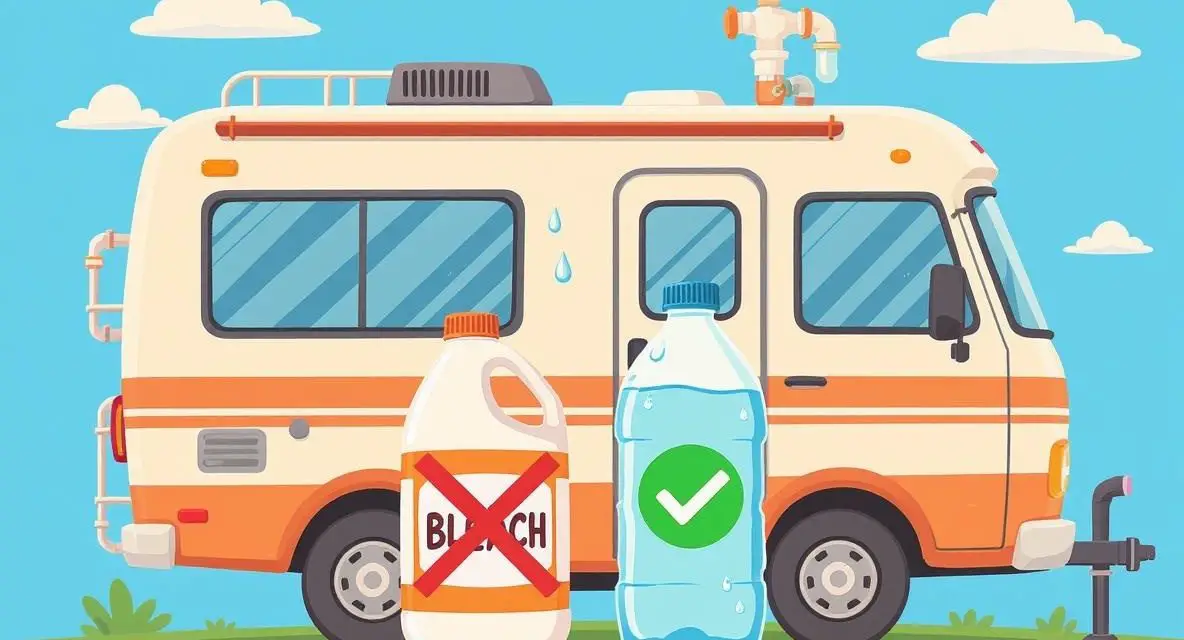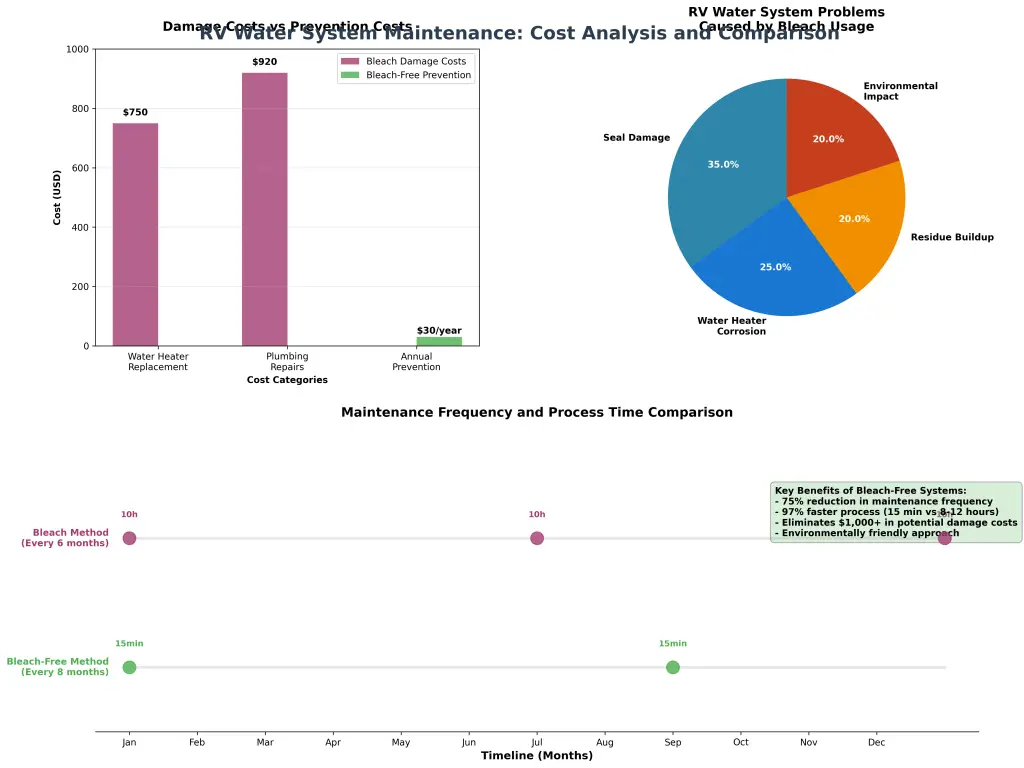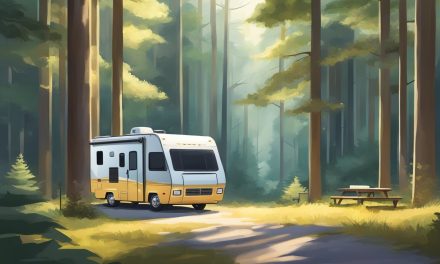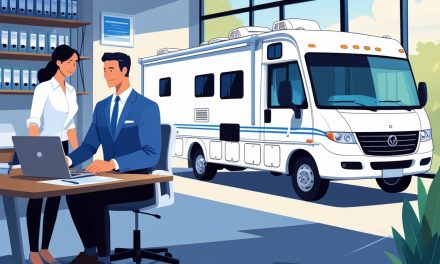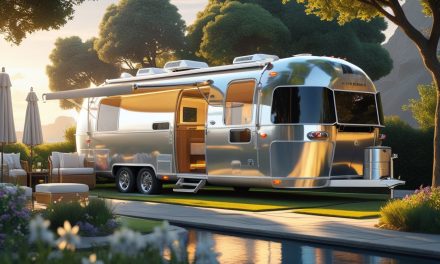Hey there, fellow road warrior! Are you still dumping bleach into your RV’s water system thinking you’re keeping things clean? Hold onto your camping chair because you’re about to discover why that “tried and true” method might be destroying your rig from the inside out. After years of RVers using bleach, there’s been a complete wake-up call that’s changing everything about how you should maintain your RV’s water system.
Your RV’s plumbing system is one of the most critical components of your mobile home, and treating it wrong can cost you thousands in repairs. The good news? There’s a revolutionary approach that’s not only safer for your RV but also saves you massive amounts of time and money.
You’ll learn about cutting-edge, NSF-certified alternatives that professional RVers are switching to in droves, and by the end of this article, you’ll understand exactly why bleach has become the enemy of smart RV maintenance.
You deserve better than outdated methods that put your investment at risk, and you’re about to discover the solution that will transform your RV experience forever.
Would you like to save this article?
1. Bleach is Silently Destroying Your RV’s Plumbing Components
Here’s what the RV industry doesn’t want you to know: bleach is incredibly corrosive to the materials that make up your RV’s water system. Those rubber seals, O-rings, and gaskets that keep your system leak-free? Bleach attacks them like acid on metal, and you’re paying the price.
The Hidden Damage Statistics You Need to Know:
- Seal damage accounts for 35% of all bleach-related RV water system problems
- You’ll face average costs of $50-$300 per incident to replace damaged seals and gaskets
- Most RVers don’t notice the damage until it’s too late – will you be next?
Your RV uses PEX lines (those flexible plastic water lines), and bleach gradually breaks down their protective properties. What starts as microscopic damage in your system eventually leads to catastrophic failures that can flood your RV interior.
The Real Kicker for Your Wallet: Most RV insurance policies don’t cover water damage caused by “maintenance-related” issues. That means you’re on the hook for potentially thousands in repairs that could have been prevented.
Nothing ruins your camping trip quite like discovering your “maintenance routine” has turned your dream RV into a soggy nightmare. You’ve probably seen fellow RVers learn this lesson the hard way, and trust me, you don’t want to be next!
2. Your Water Heater is Under Silent Attack
Water heater corrosion represents 25% of all bleach-related damage in RV water systems, and this is where things get expensive fast for you. Bleach doesn’t just clean – it chemically attacks the protective lining inside your water heater tank, setting you up for costly failures.
The Shocking Numbers That Will Hit Your Budget:
- You’ll face $300-$1,200 for average RV water heater replacement costs
- You’ll pay an additional $200-$500 in labor costs for professional installation
- You’ll lose 2-5 days of camping time waiting for parts and service
Your modern RV water heater has sophisticated internal components that weren’t designed to handle regular bleach exposure. The heating elements, temperature sensors, and internal coatings in your system all suffer from chlorine damage over time.
What You Don’t See Coming: The damage happens gradually in your system, so you won’t notice until your water heater completely fails. By then, you’re looking at emergency repairs in the middle of your vacation – at emergency prices that will shock you.
Picture this scenario: You’re at your favorite campground, ready for a hot shower after a long day of hiking, and… nothing. Cold water only. Now you’re scrambling to find an RV repair shop that’s open on weekends. If you’ve been there, you know it’s exactly as miserable as it sounds!
3. You’re Drinking Bleach Residue (And Don’t Even Know It)
This one will make your stomach turn. Bleach residue buildup accounts for 20% of water system problems, and here’s the scary part: you can’t always taste or smell it in your drinking water.
The Residue Reality Affecting Your Health:
- Bleach can remain in your system for weeks after you think you’ve “flushed” it
- Trace amounts accumulate in hard-to-reach areas of your plumbing
- Even small amounts can affect the taste of your drinking water and potentially impact your health
Your RV’s water system has numerous nooks, crannies, and low-flow areas where bleach residue loves to hide. No amount of flushing you do will completely eliminate it because the chlorine compounds bond with various materials in your system.
The Taste Test You Should Try: Many RVers report a persistent “pool water” taste that never goes away, no matter how much they flush their systems. That’s not just annoying for you – it’s evidence that bleach residue is still circulating through your drinking water.
You might have joked about your RV water tasting like a swimming pool, until you realize you’re essentially running a mobile water treatment plant with residual chlorine levels that would make a city water department nervous. That’s not exactly the “pure camping experience” you’re going for!
4. The Environmental Impact is Worse Than You Think
Environmental damage makes up 20% of the problems associated with bleach use in RVs, and this affects all of us who love the great outdoors – including you and the places you want to camp.
The Environmental Truth You Need to Face:
- When you dump bleach-treated water, you’re harming aquatic ecosystems around campgrounds
- Many RV parks now have restrictions on bleach disposal that could limit where you can stay
- You could face fines of $100-$500 in most areas for improper chemical disposal
When you dump your tanks after sanitizing with bleach, you’re introducing concentrated chlorine into soil and water systems that aren’t designed to handle it. This kills beneficial bacteria, disrupts natural water chemistry, and can harm the fish and plant life in the areas you love to visit.
The Bigger Picture for Your Future Camping: As more RVers hit the road, the cumulative environmental impact of millions of RVs using bleach adds up quickly. Some environmentally-conscious RV parks are starting to prohibit bleach-based sanitization entirely – limiting your camping options.
Since you RV to connect with nature, the last thing you want is to be the camper poisoning the very ecosystems you’re trying to enjoy. It’s like bringing a gas-powered leaf blower to a meditation retreat – you’re completely missing the point of why you’re there!
5. The Time-Consuming Process is Stealing Your Vacation
Here’s the time reality that nobody talks about: proper bleach sanitization requires a massive time investment that’s eating into your precious camping time.
The Time-Drain Breakdown Affecting Your Plans:
- Traditional bleach method requires a 10-hour process (including wait time)
- You need to repeat this every 6 months
- You’re losing 20 hours of vacation time annually to this outdated process
The bleach process isn’t just about mixing and pouring. You need to:
- Bypass your water heater (unless you want to destroy it)
- Mix precise ratios (get it wrong and you either under-sanitize or over-damage your system)
- Run it through every line in your RV
- Wait 8-12 hours for it to work while your RV is out of commission
- Flush extensively to remove residue
- Test to ensure it’s actually gone from your system
The Frustration Factor You Know Too Well: How many times have you planned a quick overnight trip only to realize you’re due for water system maintenance? That 10-hour process just turned your weekend getaway into a maintenance marathon that ruins your plans.
You can’t count how many beautiful camping days you’ve spent sitting around waiting for bleach to do its thing, instead of hiking, fishing, or just enjoying the scenery. It’s like being stuck in a laundromat when you could be at the beach!
The Game-Changing Alternative: NSF-Certified Bleach-Free Sanitizers
Now for the exciting part – the solution that’s revolutionizing RV water system maintenance for smart RVers like you! NSF-certified bleach-free sanitizers like those from companies like Blue Technology are changing everything about how you maintain your water system.
The Revolutionary Benefits You’ll Experience:
- You’ll complete the entire process in just 15 minutes (vs. 10 hours for bleach)
- You won’t need to bypass your water heater
- You’ll have no residue or aftertaste in your water
- You can dispose of it safely without environmental concerns
- You’ll need less frequent maintenance (every 8-12 months vs. 6 months)
The Science That Benefits You: These advanced sanitizers use EPA-approved, NSF-certified compounds that kill bacteria and biofilm without the corrosive effects of chlorine. They’re specifically formulated for potable water systems and won’t damage the rubber, plastic, or metal components in your RV.
Real-World Results You Can Expect: RVers using bleach-free systems report:
- Crystal clear, great-tasting water immediately after treatment
- No more “pool water” aftertaste that ruins your morning coffee
- Significant reduction in plumbing problems and repair costs
- Peace of mind about environmental impact when you dump your tanks
The Bottom Line: Your Money, Time, and Health are Worth More
Let’s talk numbers that will blow your mind and change how you think about RV maintenance:
| Cost Comparison | Bleach Method (What You’re Paying Now) | Bleach-Free Method (What You Could Pay) |
|---|---|---|
| Annual Direct Costs | $15 | $30 |
| Potential Damage Costs | $1,670 | $0 |
| Time Cost (at $25/hour) | $500 | $9.38 |
| Total Annual Cost | $2,185 | $39.38 |
Your Annual Savings: $2,145.62 Your ROI: 7,152% Your Time Saved: 97% (19.6 hours per year)
When you factor in the prevention of damage, elimination of residue problems, environmental benefits, and massive time savings, switching to bleach-free sanitization isn’t just smart for you – it’s essential for protecting your investment and maximizing your RV enjoyment.
Your Action Plan:
- Stop using bleach in your RV immediately
- Invest in NSF-certified bleach-free sanitizer for your system
- Follow the simple 15-minute process that will save you hours
- Enjoy worry-free, great-tasting water on every trip
- Use your saved time and money for more camping adventures you’ll actually remember!
The choice is clear for you: continue with an outdated, damaging, time-consuming process that’s costing you thousands, or upgrade to the method that smart RVers are embracing everywhere. Your RV, your wallet, your taste buds, and the environment will thank you for making the smart choice.
Remember, your goal isn’t just to sanitize your water system – it’s to do it safely, efficiently, and effectively so you can focus on what really matters to you: making memories on the road. You deserve better than spending your precious vacation time dealing with maintenance problems that could have been prevented. You deserve water that tastes great, a system that lasts longer, and more time to enjoy the RV lifestyle you invested in.
Meta Description: Discover why bleach is destroying your RV’s water system and costing you thousands. Learn about NSF-certified bleach-free alternatives that save you time, money, and protect your plumbing. Smart RVers are making the switch – shouldn’t you?
SOURCES
- RV LIFE – Stop Using Bleach To Sanitize Your RV Fresh Water Tank
- Lippert Components – RV Water Heater Replacement Guide
- Angie’s List – Water Heater Repair Costs 2025
- GoBluTech – NSF Certified RV Sanitizer
- The RV Smith – RV Water System Maintenance Guide
- Fresh Water Systems – Sani-System Water Softener Sanitizer

